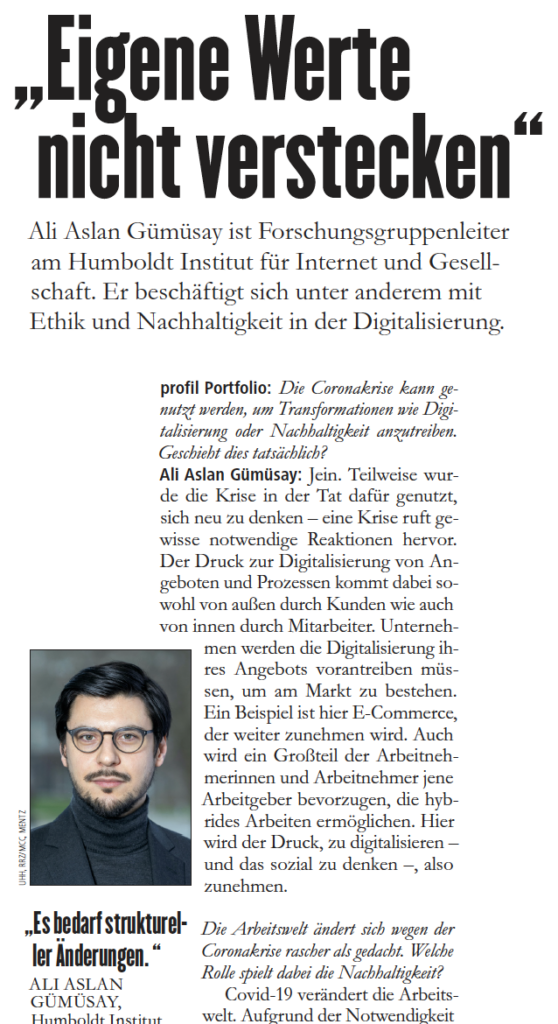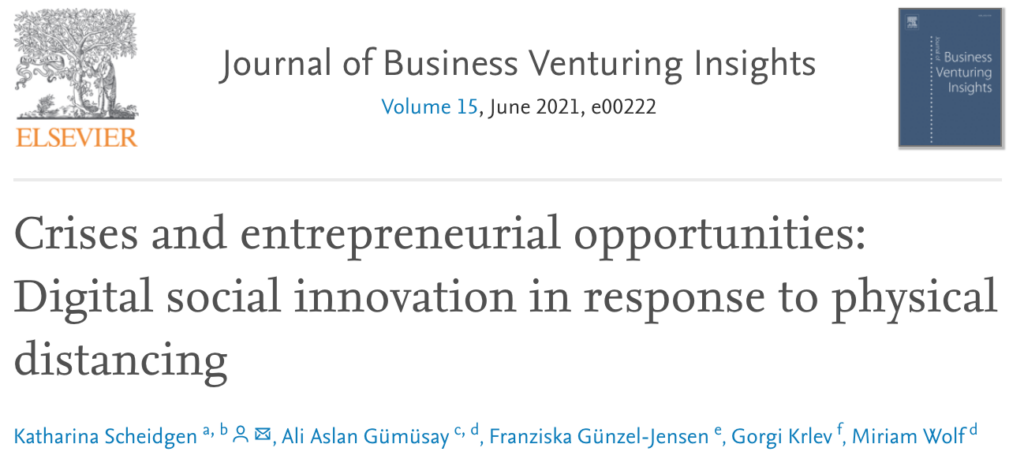Habe in den vergangenen Wochen mehrere Interviews an der Schnittstelle von Digitalisierung und Nachhaltigkeit gegeben – für das Magazin Profil, dem VHB mit 3 Thesen, und für den Howoge Nachhaltigkeitsbericht.
Digital Social Innovation
New co-authored article on digital social innovation and physical distancing.
Some highlights:
- Physical distancing constraints promote digital brokering and digitized services.
- New entrepreneurial actors engage in improvised venturing to create social innovation.
- Existing ventures engage in rapid pivoting and pro-social product extension.
- Social innovation in response to crisis can be ephemeral or enduring.
Abstract: As physical distancing is a core measure of containing the spread of COVID-19, this pandemic is a crisis that has uprooted social interaction. While current research mainly focuses on crises as a challenge for entrepreneurial ventures and potential regulatory response mechanisms, we complement this research by addressing the question of how crises in general—and COVID-19’s physical distancing measures in particular—shape entrepreneurial opportunities for social innovation. Based on two rounds of data collection—desktop research mapping out 95 entrepreneurial activities in Germany and four focus groups—we find first that entrepreneurs are proactive agents in alleviating the negative consequences of the COVID-19 crisis. They do so by creating two types of digital social innovation: digital brokering and digitized services. Second, we note that negative societal consequences of crises can be buffered by shifts in entrepreneurs’ strategic orientation through improvised venturing, rapid pivoting and pro-social product extension. Third, we note variance in the persistence of changes with consequences for entrepreneurial opportunities and social innovation: Whereas some social innovation are rather ephemeral, others might endure and promise long-term impacts. We offer key insights for the literature on crisis, social innovation and hybrid organizing as well as on the implications for entrepreneurship practice and policy.
Tackling COVID-19 as a Grand Challenge
Tackling COVID-19 requires coordinated, collaborative, and collective efforts that take into account other grand challenges including climate change. So how does this crisis relate to other grand challenges and how should we deal with the coronavirus that has triggered it?
New post by Patrick Haack and myself at Business & Society.
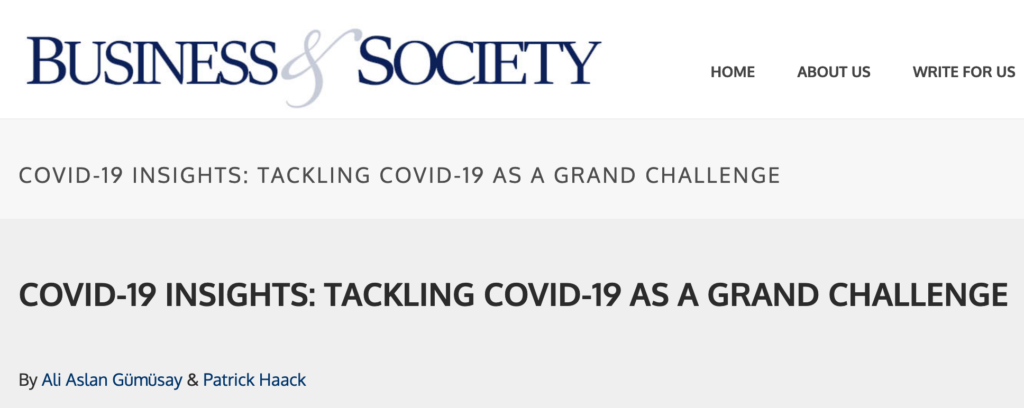
Organization, Social Entrepreneurship & Innovation
Enjoyed teaching a seminar that conjoins research on organization, social entrepreneurship and innovation (OSEI) with methodologies to study these topics empirically. Sessions were divided into two parts. The first part engaged with research topic specifics such as organizing in and for society, leading social change, social innovation, social entrepreneurship, new forms of organizing and grand challenges, and scaling social change. It commenced with an overview into the theme followed by short student presentations of research articles and in-depth discussions about articles to unpack their implications, interrelationships and conceptual and practical consequences. The second part prepared students for their own work by focusing on research methodologies such as approaching cases, doing field research, and writing up research reports. The course thus bridged high quality global research and local empirical cases.
Some objectives:
- to familiarize students with some of the core concepts and theoretical underpinnings around organization, social entrepreneurship, and social innovation
- to help students gain a stronger understanding of, and think critically about, this domain, including its research requirements and methods for publishing scholarly research
- to use a format through which students can further develop the analytical, discursive and writing skills needed as a scholar
- to offer a forum for developing, refining, and presenting own research ideas
Course schedule:
|
No |
Date |
Topic |
| 1 | 14.10.2019 | Introduction |
| 2 | 28.10.2019 | Organizing in & for Society – Case Selection |
| 3 | 11.11.2019 | Leading Social Change – Methodological Considerations |
| 4 | 25.11.2019 | Social Innovation & Entrepreneurship – Field Research |
| 5 | 09.12.2019 | New Forms of Organizing & Grand Challenges – Research Dynamics |
| 6 | 06.01.2020 | Scaling Social Change – Writing up Research Reports |
| 7 | 20.01.2020 | Re-view & out-look |
Sharing Economy, Grand Challenges & Refugees
 New piece on the sharing economy, grand challenges, social movement, platforms, and refugees fresh out at Academy of Management Discoveries. My commentary on the article by Martin Kornberger, Stephan Leixnering, Renate Meyer & Markus Höllerer.
New piece on the sharing economy, grand challenges, social movement, platforms, and refugees fresh out at Academy of Management Discoveries. My commentary on the article by Martin Kornberger, Stephan Leixnering, Renate Meyer & Markus Höllerer.
Excerpt
The sharing economy is frequently linked to companies such as Airbnb and Uber that enable “collaborative consumption” (Botsman & Rogers, 2010), that is people make their personal belongings (e.g., vehicles, homes) or services (e.g., workforce) available to virtual strangers through community-based online services (Hamari, Sjöklint, & Ukkonen, 2016; Mair & Reischauer, 2017). Platform companies are not sharing their resources, but share other people’s resources. In these cases, resources that were private like a home or car become goods or services. A novel reservoire of goods and labor is marketized and employed in the capitalist system through digital technologies. Sharing is an increase in the utilized capacity of resources.
However, these types of sharing have a bitter-sweet aftertaste, because they effectively sell – not share – temporarily resources through platform economies without a shared sense of caring. By combining two organizational types, platform and social movement, to a novel form of organzing, the authors potentially present a means to allow the sharing of resources without the surplus value being taken by few companies. Value and values are aligned into a value(s) pursuit (Gümüsay, 2017) and sharing becomes both a transaction and interaction as well as an economic and moral activity.
Hybrid organizing in the face of grand challenges
This  article appeared on the Copenhagen Business School the Business of Society blog.
article appeared on the Copenhagen Business School the Business of Society blog.
Sharing is not always caring
In 2015, thousands of refugees arrived in Europe. A recent paper by Kornberger and colleagues (2017) zooms in on the “Train of Hope”, a civil society organization that organically gained exclusive operational command at Vienna’s main train station during this refugee crisis. The paper is a critical reflection on much of the current sharing economy ‘hype’. In contrast to cases of “collaborative consumption”, where platform companies such as AirBnB or Uber offer (share?) other people’s resources, this is an exemplary case of engagement and sharing without expectations for direct individual return: a sharing of a concern for social well-being. Sharing then becomes caring. …
For the full article please visit the Business of Society blog.
New scientific network “Grand Challenges & New Forms of Organizing”
The German Research Foundation has approved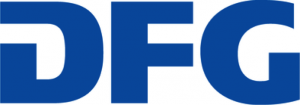 funding for our scientific network. Over the next 3 years the network studies the relationship between societal grand challenges and new forms of organizing.
funding for our scientific network. Over the next 3 years the network studies the relationship between societal grand challenges and new forms of organizing.
Grand challenges represent fundamental, global societal challenges of ecological or social nature that require coordinated and collective efforts of multiple actors, including business firms, governments, civil society, and academia. Solving problems like global poverty, climate change or precarious working conditions that emerged as an effect of digitalization and the “sharing economy” are key challenges both for researchers as well as practitioners. At the same time, opportunities arise when considering the role of new technologies and approaches to address grand challenges. They enable the emergence of new forms of temporary, flexible and fluid organizing that may be necessary to discern possible solutions. Yet, academic research that examines the reciprocal relationship between grand challenges and new forms of organization is still nascent.
This network takes an organizational theory perspective on the reciprocal relationship by asking two interdependent research questions. The first question is: What is the relationship between new forms of organizing and grand challenges? Our aim to theorize this relationship is not without complications: On the one hand, examining new forms of organizing in light of grand challenges requires a high degree of theoretical and methodological pluralism in our research. On the other hand, devising practically and managerially relevant solutions requires some degree of consensus among the academic community. The second research question that this network therefore seeks to address is: How can scientific research develop consistent practical implications despite the theoretical and methodological pluralism that pervades organizational research?
Graphical overview: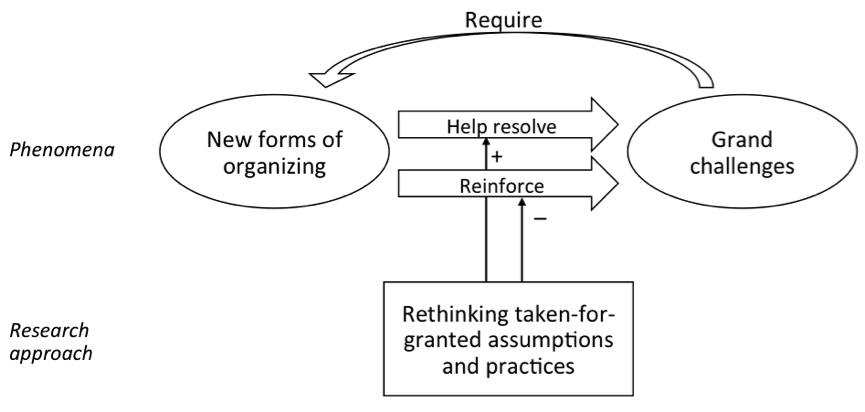
Further information:
|
Project Duration |
June 2018 – May 2021 |
|
Funding Agency |
Deutsche Forschungsgemeinschaft (DFG) |
|
Principal Investigator |
Dr. Ali Aslan Gümüsay |
|
Cooperation Partners |
Dr. Emilio Marti |
|
Network Members |
Dr. Marlen de la Chaux |
An organizational perspective on grand challenges
I recently spoke about an organizational perspective on grand challenges for the science platform sustainability 2030. My talk covered issues such as sustainable development goals, sharing economy, organizational hybridity, new forms of organizing and collaboration as well as robust action strategies.
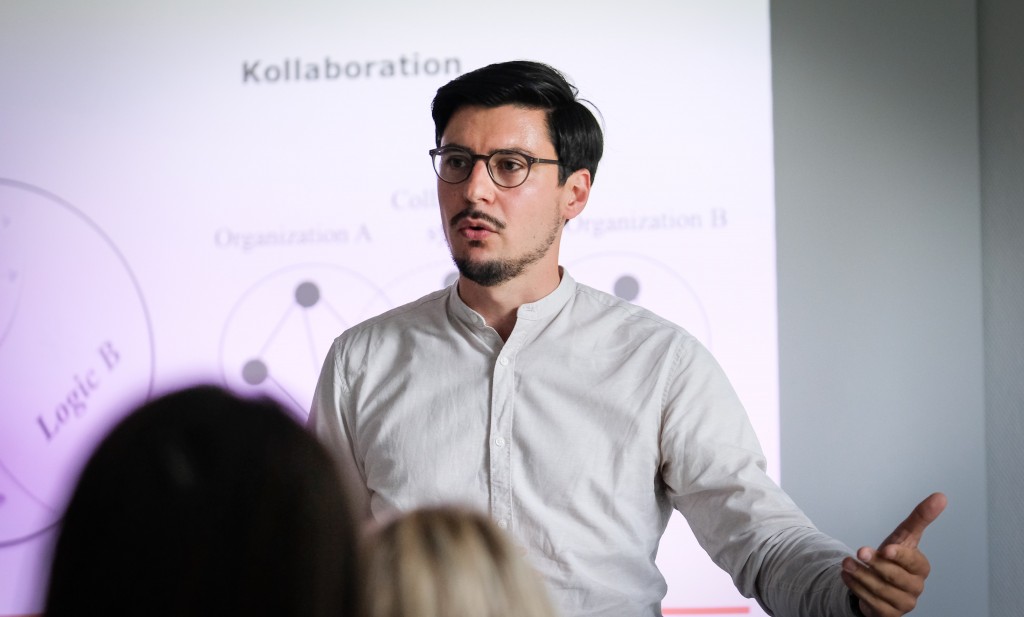
©WPN2030
Wir Knowmaden
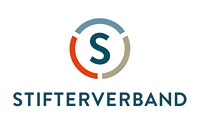 Der Essay “Wir Knowmaden” wurde von dem Stifterverband für die Deutsche Wissenschaft ausgezeichnet.
Der Essay “Wir Knowmaden” wurde von dem Stifterverband für die Deutsche Wissenschaft ausgezeichnet.
„Der Mensch wird frei geboren, und überall liegt er in Ketten“, schrieb der französische Philosoph Rousseau. Er könnte von unserer Bildungslandschaft gesprochen haben. Sie gleicht häufig einem ermüdenden Bildungskorsett statt einem ermündigenden Bildungsgerüst. Knowmaden werden so gefesselt statt entfesselt. Was macht eigentlich unsere Bildung aus uns und wir mit ihr im digitalen Zeitalter? …”
7 Tugenden Reloaded
Mit unserem Essay sind wir zweiter beim Hohe Luft Schreibwettbewerb geworden. Der Essay ist entsprungen aus dem gleichnamigen Buch “7 Tugenden Reloaded“, welches wir im Rahmen des Think Tank 30 des Club of Rome verfasst haben. Nachfolgend der Ausschnitt, den wir während einer Lesung in Wien vorgetragen haben:
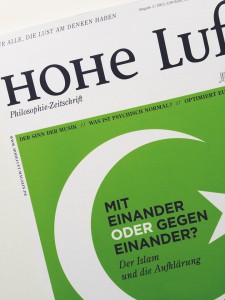
In einer sich stetig wandelnden Welt, die immer unübersichtlicher wird, immer schneller und getriebener, sehnen sich viele Menschen nach etwas, das bleibt. Wenn nichts mehr sicher scheint, suchen wir nach Halt und Orientierung. Aber wonach suchen? Wonach sich richten?
Seit zwei Jahrtausenden zählt die abendländische Tradition dieselben altbewährten sieben Tugenden: Glaube, Liebe, Hoffnung, Weisheit, Gerechtigkeit, Mut und Mäßigung. In der griechisch-römischen und christlichen Ethik formulieren sie den Maßstab für ein gutes und sinnstiftendes Leben und Zusammenleben; sie ordnen unser Verhalten, unsere Pflichten und Beziehungen, prägen unsere Institutionen. Sie bilden ein Gerüst, das unser Zusammenleben unbemerkt organisiert; weben einen kulturellen Teppich, der unsere Gesellschaft zusammenhält.
Wie können wir die alten Tugenden neu erfinden und Werte neu denken? Uns ist bewusst: Werte sind nicht so einfach in den Alltag übersetzbar, wie es manchmal scheinen mag. Auch Werte bieten nicht immer klare Richtlinien, die uns Konflikte ersparen würden. Wir müssen immer wieder neu gemeinsam bedenken, wie wir diese Werte deuten und verstehen wollen. Und dennoch glauben wir daran, dass sich Werte und Tugenden bei aktuellen Herausforderungen bewähren können. Denn gerade wegen der Hektik des Alltags, gerade wegen der Zwänge des Tagesgeschäfts in Politik und Unternehmen ist ein Wertegerüst, das Halt und Orientierung bietet in einer sich rasch ändernden Welt, umso wichtiger.
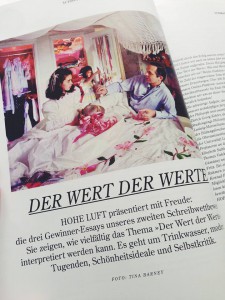 Wir plädieren für mehr Weisheit in der Bildung durch Bildungsgerechtigkeit, Bildungsvielfalt und Bildungsflexibilität. Bildung heute fühlt sich für uns Knowmaden zu häufig eher nach einem einengenden Korsett, als nach einem Schlüssel zu mannigfaltigen Handlungsoptionen an. Deshalb brauchen wir flexiblere und mobilere Bildungspfade, Bildungsabos und Bildungsmodule sowie ein ganzheitliches Bildungsverständnis, welches den Menschen als komplexes Wesen samt Körper, Herz und Verstand betrachtet.
Wir plädieren für mehr Weisheit in der Bildung durch Bildungsgerechtigkeit, Bildungsvielfalt und Bildungsflexibilität. Bildung heute fühlt sich für uns Knowmaden zu häufig eher nach einem einengenden Korsett, als nach einem Schlüssel zu mannigfaltigen Handlungsoptionen an. Deshalb brauchen wir flexiblere und mobilere Bildungspfade, Bildungsabos und Bildungsmodule sowie ein ganzheitliches Bildungsverständnis, welches den Menschen als komplexes Wesen samt Körper, Herz und Verstand betrachtet.
Wir fordern Mäßigung durch Datensparsamkeit beim Daten-Striptease des gläsernen Bürgers und Konsumenten. Ähnlich dem Roman Nineteen eighty-four, nur knapp 30 Jahre später als von Orwell literarisch prognostiziert, leben wir in einer Zeit der Allgegenwart des Datensammelns durch Bonus-Systeme, Online-Tracking und soziale Netzwerke. Wir müssen unsere informationelle Selbstbestimmung stärken und Aufklärung, (Selbst)Zügelung und Boykott fördern und fordern.
Wir sehnen uns nach einer mutigen Zivilgesellschaft, die Verantwortung wahrnimmt durch gemeinsames Engagement und aktive Mitbestimmung. Eine Entwicklung vom Wutbürger zum Mutbürger ist ein Plädoyer für eine aktive Zivilgesellschaft.
Statt Sonntagsreden suchen wir echte Generationengerechtigkeit zwischen Jung und Alt, Gegenwart und Zukunft. Leider gilt: Wer wählt, der zählt. So geben die Alten den Ton in den Institutionen an. Wir brauchen Reformen in unserem Rentensystem und Arbeitsmarkt, müssen die Staatsverschuldung stoppen und unsere Umwelt so behandeln, wie sie es verdient: nachhaltig. Getreu dem indischen Sprichwort: Wir erben die Erde nicht von unseren Vorfahren, wir leihen sie von unseren Kindern aus.
Mit Hoffnung wagen wir uns an die Energiewende. Wir müssen Energieproduktion und Energiekonsum neu und innovativ denken und uns von Uran und fossilen Brennstoffen lösen. Wir brauchen eine Demokratisierung der Energienetze, mehr Ökostrom, ein innovatives Supergrid und eine europäische Ausrichtung in der Energiepolitik.
Der Glaube an unser Wirtschaftssystem ist erschüttert. Bankenkrise, schwarze Schafe und Fehlentscheidungen haben die Entscheidungstragenden in der Wirtschaft in eine tiefe Vertrauenskrise gestürzt. Es herrscht kollektives Unbehagen. Wir träumen von mehr werteorientiertem Handeln und der Kraft des Glaubens als gemeinsame gesellschaftliche Veränderungskraft für soziale Verantwortung.
Zuletzt die Liebe: Die Nächstenliebe als Ausgangspunkt kann uns helfen, die Globalisierung nachhaltig als Chance zu gestalten, die eine weltweite Gemeinschaft von Mitmenschen unterstützt, in der wir globalen Herausforderungen gemeinsam begegnen.
Wir brauchen ein Tugendupdate für das Gute. Nur durch ein starkes Werte-Denken können wir Denkens-Wertes schaffen. Und nur wenn wir die Fragen nach dem Sinn und Unsinn dessen, was wir tun, wie und warum wir es tun, angehen, können wir Tiefenwirkung erzielen und unsere Gesellschaft nachhaltig gestalten. Es geht nicht darum, alte Pfade zu begehen, sondern mit den antiken Tugenden den Pfad in die Zukunft zu bestreiten – hin zu einem guten, tugendhaften, nachhaltigen Leben.
Finanzkrise, Wirtschaftskrise, Sinnkrise. Es heißt, noch nie sei es den Menschen so gut gegangen wie heute, und doch scheinen wir bis über beide Ohren in Krisen zu stecken. Vielleicht hilft dieser Blick auf die Gegenwart durch das Prisma vergangener Tugenden − für ein wertevolles Handeln in der Zukunft.
Ali Aslan Gümüsay & Katharina Diel-Gligor
